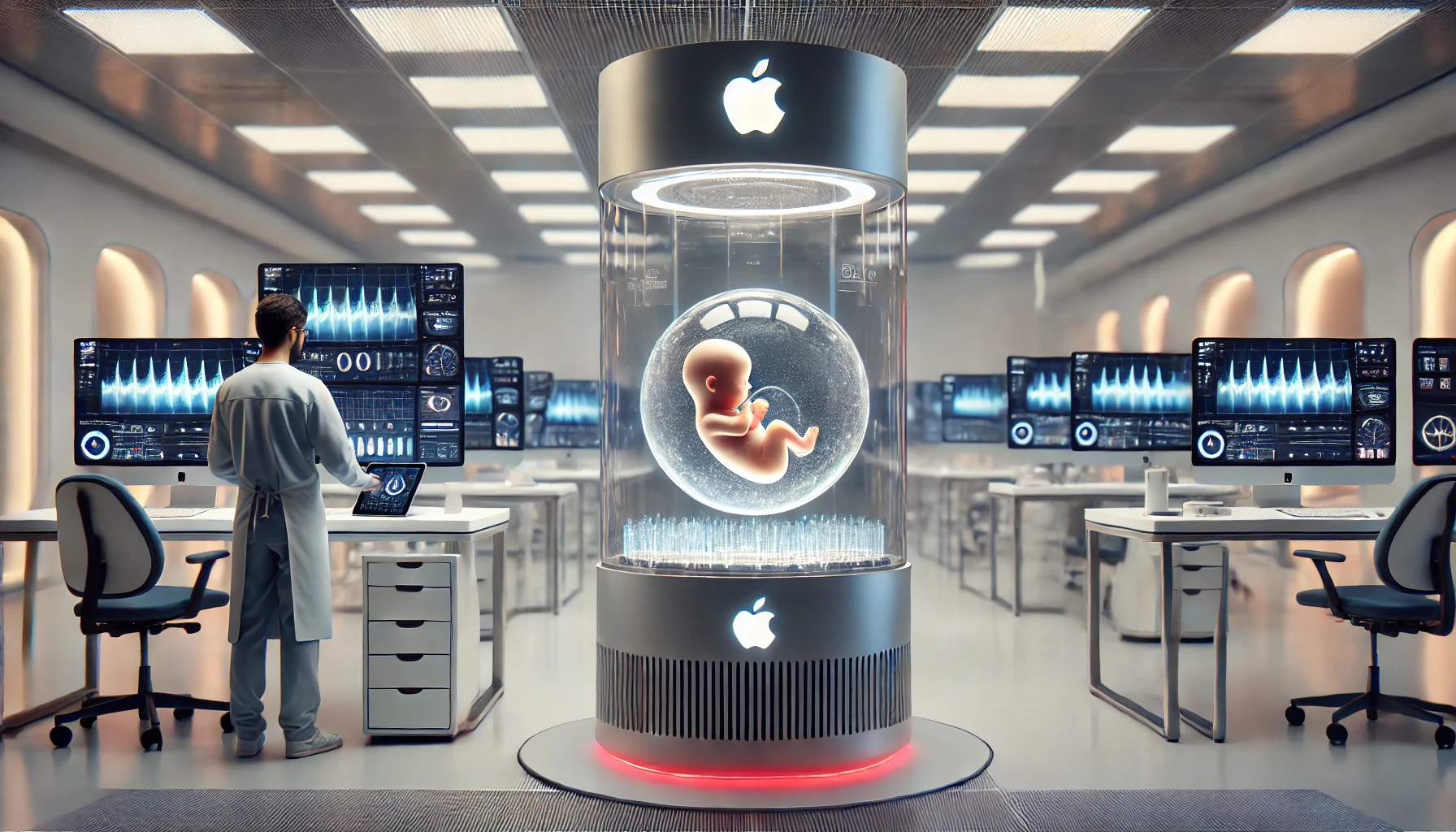Apple has done it again. Just when we thought they’d exhausted every possible way to integrate technology into the most intimate aspects of our lives, they’ve gone and outdone themselves. Introducing the ‘Work from Womb’ program—a visionary initiative designed to ensure that the next generation doesn’t waste a single second of their pre-birth existence.
At a highly anticipated event, Tim Cook took to the stage to reveal Apple’s latest creation: a prenatal productivity suite that’s set to revolutionize how we think about work-life balance. “Why should we wait until after birth to start harnessing human potential?” Cook asked the eager crowd, who nodded along, mesmerized by the glowing hologram of a fetus clad in tiny, wireless AirPods. “With ‘Work from Womb,’ we’re giving new meaning to the term ‘born to work.’”
The program centers around a cutting-edge device known as the iFetus Pro, a sleek, ultra-lightweight tablet designed to be attached to the mother’s abdomen. Through a series of gentle vibrations and soft chimes, the device communicates with the fetus, encouraging them to start contributing to the gig economy even before they’ve developed a fully functional digestive system.
The iFetus Pro comes preloaded with a suite of apps tailored to fetal needs. There’s ‘CodeMitosis,’ which introduces unborn children to basic coding principles, and ‘WombWellness,’ an app that tracks fetal productivity levels and sends real-time data to expectant parents, so they can monitor their child’s progress in the lead-up to delivery. There’s even a fetal version of Slack, ensuring that baby’s first words might just be, “Please see my comments above.”
As part of the launch, Apple has also partnered with major tech firms to roll out a series of prenatal internships. These companies, eager to tap into fresh talent, are offering positions in data entry, content creation, and customer service—all from the comfort of the womb. “We’re thrilled to be part of this groundbreaking initiative,” said a spokesperson for Google. “Imagine the synergy when a child’s first internship coincides with the development of their central nervous system.”
Naturally, the announcement has sparked a flurry of excitement among Silicon Valley’s elite. Expectant parents are already lining up to reserve their iFetus Pro devices, eager to give their unborn children a competitive edge. “I just want my baby to have the best possible start,” said one mother-to-be, proudly displaying her new ‘Work from Womb’ branded maternity wear. “If they can start building their resume before they’re even born, why wouldn’t I want that for them?”
However, not everyone is thrilled about the prospect of fetal employment. Critics have raised ethical concerns, questioning whether it’s fair to impose work expectations on beings that haven’t yet developed fully formed limbs. Others are worried about the psychological impact, wondering if babies subjected to prenatal KPIs might develop an unhealthy relationship with work before they’ve even had a chance to suck their thumb.
But Apple remains undeterred. In response to the backlash, the company has announced plans for a ‘WombWellness’ initiative, which will include a series of mindfulness apps designed to help fetuses manage the stress of meeting deadlines and achieving milestones. There’s even talk of a fetal labor union, though experts are divided on whether a fetus can legally engage in collective bargaining.
As for the future, Apple’s vision doesn’t stop at birth. They’re already developing a line of postnatal accessories designed to seamlessly transition infants from womb to workplace. The iCrib Pro, for example, features an ergonomic design that encourages proper posture during early coding sessions, while the iPacifier boasts a built-in Bluetooth connection for hands-free conference calls.
In the end, Apple’s ‘Work from Womb’ initiative represents the next logical step in a world where work and life are increasingly inseparable. As Tim Cook concluded his presentation, the message was clear: in the pursuit of productivity, it’s never too early to start. And with Apple leading the charge, we can all rest assured that the future workforce is in good hands—tiny, fetal hands, clutching the latest in wearable tech.

